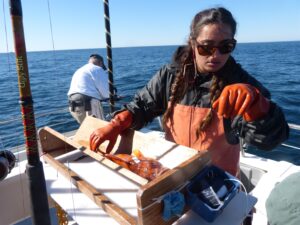"Geographic variation in the life history and demography of Canary Rockfish, Sebastes pinniger, along the U.S. West Coast"
A Thesis Defense by Rachel Brooks
MLML Live-Stream | July 2, 2021 at 10 am
Thesis Abstract:
Marine fishes that persist across broad geographic ranges experience gradients in environmental and oceanographic conditions, anthropogenic stressors, and ecological factors that influence their population dynamics. Understanding the spatial- and temporal-scales at which life history characteristics and demographic patterns vary, are essential for successful management and long-term sustainability of marine fisheries. From 2017 through 2019, 1,567 Canary Rockfish were collected from 13 port locations along the U.S. West Coast, to investigate latitudinal patterns in size- and age-structure, growth, maturity, condition, and mortality, as wells as to identify biologically relevant population breakpoints along the coast. Sex-specific differences in life history parameters were also investigated coastwide. Canary Rockfish exhibited strong latitudinal patterns in life history parameters; Canary Rockfish from colder, northern port locations exhibited larger sizes-at-age, lived longer, matured at larger sizes, and had lower mortality rates than Canary Rockfish from warmer, southern port locations. Male Canary Rockfish exhibited smaller sizes-at-age, lived longer, and matured at similar sizes in comparison to female conspecifics. Trends in life history parameters were correlated with coastwide environmental patterns in sea surface temperature and primary productivity (chlorophyll a). Cluster analysis using life history traits indicated central Oregon as a biologically relevant break point for Canary Rockfish populations along the U.S. West Coast and should be considered in future stock assessment models. Further research should explore stock structure through genetic analysis and compare hook-and-line data from untrawlable habitats with fishery-independent bottom trawl surveys to assess habitat-based differences in Canary Rockfish life history and demography.




